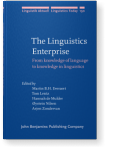Metalinguistic processing and acquisition within the MOGUL framework
MOGUL (Modular On-line Growth and Use of Language) is a framework that builds on Jackendoff’s views about the language faculty. Jackendoff’s approach not only has ‘psychological’ reality in that it claims to account for linguistic knowledge in the individual and the logical problem of language acquisition, it also has what might be called ‘psycholinguistic’ reality making claims about on-line language processing as well.This aspect is exploited in MOGUL’s account of language acquisition and performance and, amongst other things, permits explicit accounts of metalinguistic ability, here claimed to be a mental system developed and operated largely outside the modular language system and resulting in a different type of grammatical knowledge, one which complements and also conflicts with intuitively cognised grammar to which we have no conscious access.
Cited by (3)
Cited by three other publications
Bardel, Camilla & Laura Sanchez
Sánchez, Laura & Camilla Bardel
2016.
Cognitive factors, linguistic perceptions and transfer in third language learning.
Revue française de linguistique appliquée Vol. XXI:2
► pp. 123 ff.

SÁNCHEZ, LAURA
2015.
L2 activation and blending in third language acquisition: Evidence of crosslinguistic influence from the L2 in a longitudinal study on the acquisition of L3 English.
Bilingualism: Language and Cognition 18:2
► pp. 252 ff.

This list is based on CrossRef data as of 15 july 2024. Please note that it may not be complete. Sources presented here have been supplied by the respective publishers.
Any errors therein should be reported to them.
